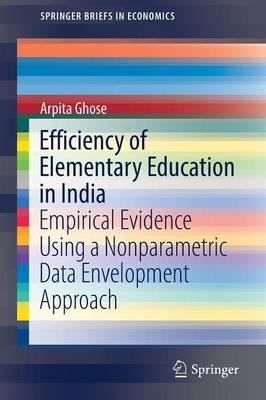Overview
This book assesses how efficient primary and upper primary education is across different states of India considering both output oriented and input oriented measures of technical efficiency. It identifies the most important factors that could produce differential efficiency among the states, including the effects of central grants, school-specific infrastructures, social indicators and policy variables, as well as state-specific factors like per-capita net-state-domestic-product from the service sector, inequality in distribution of income (Gini coefficient), the percentage of people living below the poverty line and the density of population. The study covers the period 2005-06 to 2010-11 and all the states and union territories of India, which are categorized into two separate groups, namely: (i) General Category States (GCS); and (ii) Special Category States (SCS) and Union Territories (UT). It uses non-parametric Data Envelopment Analysis (DEA) andobtains the Technology Closeness Ratio (TCR), measuring whether the maximum output producible from an input bundle by a school within a given group is as high as what could be produced if the school could choose to join the other group. The major departure of this book is its approach to estimating technical efficiency (TE), which does not use a single frontier encompassing all the states and UT, as is done in the available literature. Rather, this method assumes that GCS, SCS and UT are not homogeneous and operate under different fiscal and economic conditions.
Full Product Details
Author: Arpita Ghose
Publisher: Springer, India, Private Ltd
Imprint: Springer, India, Private Ltd
Edition: 1st ed. 2017
Dimensions:
Width: 15.50cm
, Height: 0.60cm
, Length: 23.50cm
Weight: 1.766kg
ISBN: 9788132236597
ISBN 10: 8132236599
Pages: 94
Publication Date: 13 October 2016
Audience:
Professional and scholarly
,
College/higher education
,
Professional & Vocational
,
Postgraduate, Research & Scholarly
Format: Paperback
Publisher's Status: Active
Availability: Manufactured on demand

We will order this item for you from a manufactured on demand supplier.
Author Information
Arpita Ghose is a Professor in the Department of Economics, Jadavpur University. She did her Ph.D. from Indian Statistical Institute, Kolkata and worked in the area of disequilibrium economics. She has research publications in reputed national and international Journals. At present, she is working on Computable General Equilibrium models, Productivity and Efficiency analysis using Data Envelopment Approach and Stochastic Frontier Models and also on Applied Time Series Econometrics. She has presented research papers and chaired session at different international conferences and symposium; completed major projects funded by DFID-UNCTAD-Government of India- Jadavpur University- Trade Research Capacity Building Program, Shastri -Indo-Canadian Institute, Calgary, Canada , UGC and ICSSR, among others, and have also supervised Ph.D. students. Her major research areas of interest are Econometrics, Macroeconomics, Economics of Social Sector and Regional Development.




